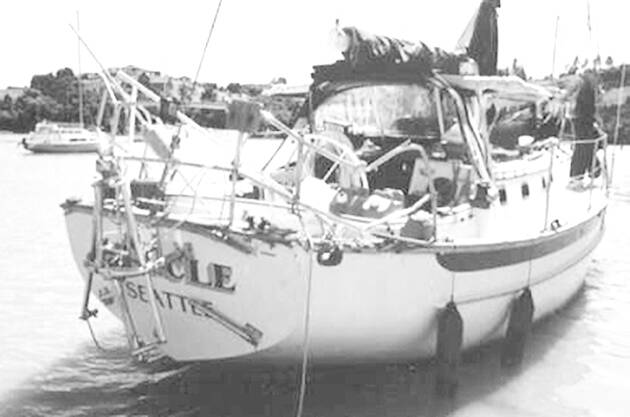Editor’s note: Fred McGinnis shared this story about an experience he had on his old sailboat decades ago.
We left Seattle and sailed down the coast to San Diego. We departed in mid-May from San Diego and planned to arrive at Cabo San Lucas later that month.
We decided to sail offshore southwesterly, rounding the Guadalupe Islands, and heading southeasterly toward Cabo. We were three days out of San Diego, and about 20 nautical miles northwest of the islands. At midnight, Rita had just come on watch. It was overcast and moonless with moderate seas, with 3- to 4-foot swells. The log was indicating 4 to 5 knots.
She had only been on watch for 20 minutes, when the boat suddenly pitched bow up at 50 degrees, causing several bagged sails to tumble out of the foc’sle and end up aft. My first thought was about Rita in the cockpit. I fell out of my bunk, and scrambled over the sail bags, and up the ladder to find Rita’s arms wrapped around the binnacle asking me what had happened.
The boat was now horizontal, but dead in the water. I had anticipated a deluge of ocean water sweeping over the deck, and cockpit, but absolutely no water engulfed us. A few moments later the sails filled again, and we started making way.
It was then that Rita noted that the wheel was spinning loosely, and the boat was not responding. I assumed that the steering cables in the lazarette had broken. We were both mentally exhausted, so we decided to simply heave-to for the remainder of the night.
The following morning, I inspected the cables and found them intact, with the wheel properly actuating the quadrants below, but no rudder control. It was then I decided to issue a Pan message, on VHF, to alert any vessel in the area of our predicament.
I was dumbfounded when Long Beach Radio responded. We were hundreds of miles from the Long Beach Coast Guard Station. I gave them our position, and explained that we had no steerage. I was finally able to launch the dingy, allowing me to see the rudder jammed up against the starboard side of the hull. It was evident that when the boat dropped back into the water, the force of the impact had snapped the rudder loose from the stock.
It was then that a Coast Guard Lear Jet was circling overhead, informing me that the Coast Guard Cutter Rush was four hours from our position and was offering assistance.
Four hours later we were on the lee side of the 400-foot-long Rush. After a short inspection they agreed that they could not repair the damage, but would tow us back to San Diego. They took Rita off the Oracle, and posted two sailors on board. The sailors were rotated every 24 hours and were vying for duty because we had beer and snacks. The tow lasted three days.
Rita was transferred off the Rush by helicopter, and the Oracle was hauled out. An inspection of the rudder revealed that four flanges inside the fiberglass rudder had broken loose.
I reflected on what happened that night and for many years afterward. The sequence of events did not add up, to being impacted by a rogue wave. The force required to break the rudder could only be achieved if the entire boat had been lifted bow up a considerable distance and dropped into the water stern first. Being hoisted in a matter of seconds, and dropped suddenly, with absolutely no sea water washing over the deck, does not fit the normal cycle of a vessel passing over a large wave.
Now comes the speculation. We were in the same area where pilots off the USS Nimitz in 1994 had observed unidentified ariel objects diving under the water and re-emerging. Rita recalls seeing the water back lit with a blue-white hue, with no discernible phosphorescence.
Years later we drove our motorhome down the Mexican Coast, and stopped at Manzanillo, which lies west from the Guadalupe Islands. We spoke to a man who invited us to park on his property. He described the “luz del Cielo,” or heavenly lights, that sometimes would entertain the locals.
The conclusion could be that the Oracle may have the distinction of being the only ocean sailboat ever propelled out of the water by a UFO, and we were able to survive the incident.
Fred M. McGinnis is a retired captain of the US Navy.



